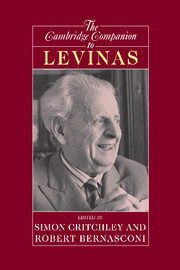Book contents
- Frontmatter
- 1 Introduction
- 2 Levinas and Judaism
- 3 Levinas and the face of the other
- 4 Levinas's critique of Husserl
- 5 Levinas and the Talmud
- 6 Levinas and language
- 7 Levinas, feminism and the feminine
- 8 Sincerity and the end of theodicy
- 9 Language and alterity in the thought of Levinas
- 10 The concepts of art and poetry in Emmanuel Levinas's writings
- 11 What is the question to which 'substitution' is the answer?
- 12 Evil and the temptation of theodicy
- Bibliography
- Index
10 - The concepts of art and poetry in Emmanuel Levinas's writings
Published online by Cambridge University Press: 28 May 2006
- Frontmatter
- 1 Introduction
- 2 Levinas and Judaism
- 3 Levinas and the face of the other
- 4 Levinas's critique of Husserl
- 5 Levinas and the Talmud
- 6 Levinas and language
- 7 Levinas, feminism and the feminine
- 8 Sincerity and the end of theodicy
- 9 Language and alterity in the thought of Levinas
- 10 The concepts of art and poetry in Emmanuel Levinas's writings
- 11 What is the question to which 'substitution' is the answer?
- 12 Evil and the temptation of theodicy
- Bibliography
- Index
Summary
Being’s essence designates nothing that could be a nameable content, a thing, event, or action; it names this mobility of the immobile, this multiplication of the identical, this diastasis of the punctual, this lapse. This modification without alteration or displacement, being’s essence or time, does not await, in addition, an illumination that would allow for an ‘act of consciousness.’ This modification is precisely the visibility of the same to the same, which is sometimes called openness. The work of being, essence, time, the lapse of time, is exposition, truth, philosophy. Being’s essence is a dissipating of opacity, not only because this ‘drawing out’ of being would have to have been first understood so that truth could be told about things, events and acts that are; but because this drawing out is the original dissipation of opaqueness.
Otherwise than Being, or Beyond EssenceEmmanuel Levinas's writings are rich in comments and reflections on art, poetry and the relations between poetry and ethical theory. Of particular importance is the question of language, because there appears to be a kind of symmetry between language as an ethical relation and the language of poetry, both of which expose us to regions of subjectivity or existence on the hither side of cognition and being. The ethical and the poetic are evidently species of saying (le Dire) in contrast to the propositional character of the said (le Dit), yet neither one is translatable into the other, and in fact they are in some sense at odds with one another.
- Type
- Chapter
- Information
- The Cambridge Companion to Levinas , pp. 206 - 233Publisher: Cambridge University PressPrint publication year: 2002
- 2
- Cited by



